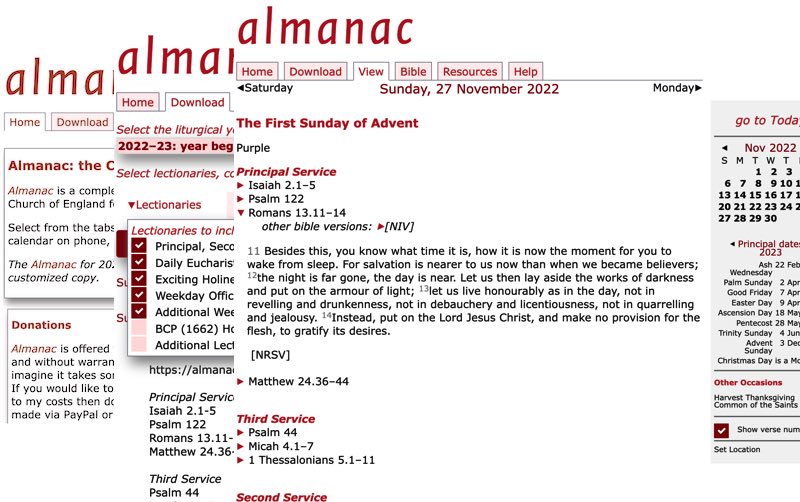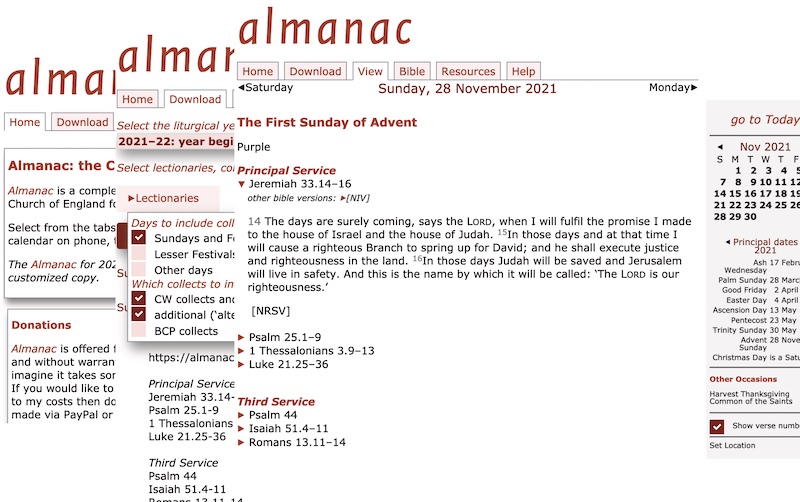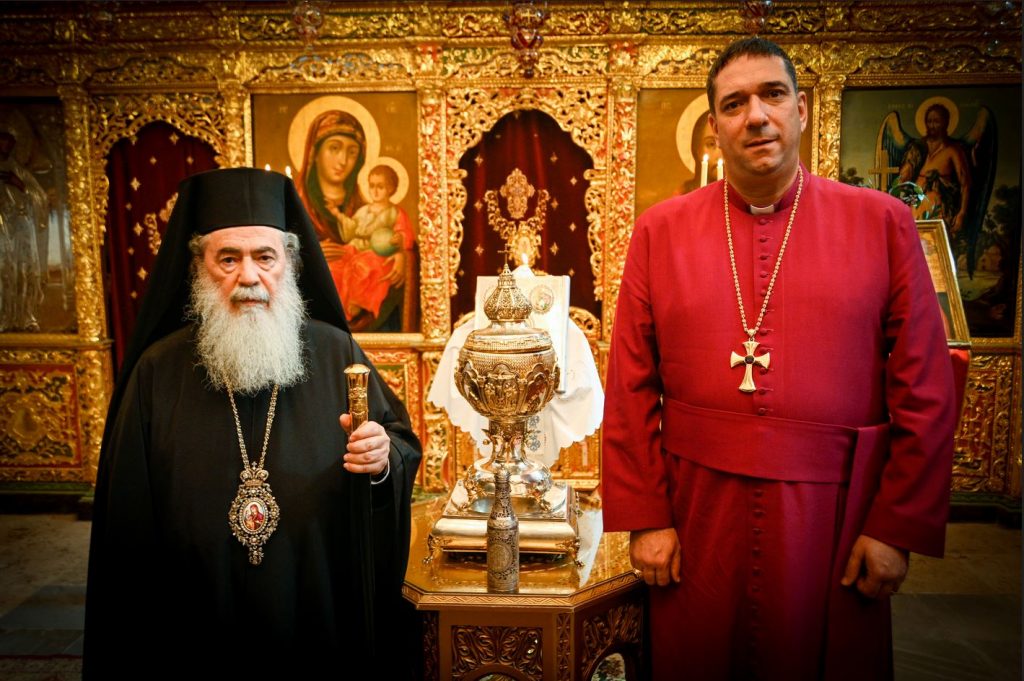The Coronation Oil
The oil that will be used to anoint the king and queen at their coronation on 6 May has been consecrated in Jerusalem by the Orthodox Patriarch of Jerusalem and the Anglican Archbishop. The Archbishop of Canterbury’s website reports the details here, and that article is archived below.
0 CommentsCommon Worship Almanac for 2022-23
My Almanac for the liturgical year 2022–23, the year beginning Advent Sunday 2022 is now available. The Almanac is a complete and customizable download that can be added to the calendar on a desktop/laptop, a tablet or a smartphone providing a fully-worked out calendar and lectionary according to the rules of the Church of England. Several download formats are provided, giving access to most calendar software on most devices.
As before, download is free, and donations are invited.

What's new?
The Almanac is also available as a web page that can be installed as a web app on smartphones and tablets for easy access to all the data. New features include
- In the View tab you can toggle the display of verse numbers in the readings, making it simpler to copy and paste passages to other documents in the desired format.
- Following the new Royal Warrant, updated BCP and CW prayers for the King and Royal Family are linked in the Resources tab; Accession Day is now on 8 September, rather than 6 February.
- Although not strictly a CW or BCP observation, an entry is included this year for Coronation Day on 6 May 2023; it is expected that resources for public observance of the coronation will be produced, and this material will be added when it is available.
- Astronomical data (sunrise, sunset, moon rise and set and phase, solstices and equinoxes) is now fully working again, as is the separate Crosscal calendar download at crosscal.oremus.org.
Donations
This Almanac is offered free of charge, and without warranty, but as you might imagine it takes some effort to compile. If you would like to make a contribution to my costs then donations may be made via PayPal at paypal.me/simonkershaw. Alternatively, Amazon gift vouchers can be purchased online at Amazon (amazon.co.uk) for delivery by email to simon@kershaw.org.uk .
The Almanac has been freely available for over 20 years. There is not and has never been any charge for downloading and using the Almanac — this is just an opportunity to make a donation, if you so wish. Many thanks to those of you who have donated in the past or will do so this year, particularly those who regularly make a donation: your generosity is appreciated and makes the Almanac possible.
0 CommentsCommon Worship Almanac for 2021-22
My Almanac for the liturgical year 2021–22, the year beginning Advent Sunday 2021 is now available. The Almanac is a complete and customizable download that can be added to the calendar on a desktop/laptop, a tablet or a smartphone providing a fully-worked out calendar and lectionary according to the rules of the Church of England. Several download formats are provided, giving access to most calendar software on most devices.
As before, download is free, and donations are invited.

What's new?
The Almanac is also available as a web page that can be installed as a web app on smartphones and tablets for easy access to all the data. New features include
- the Download tab now shows a live preview of the data that will be added to your calendar; as you select options from the menus the live preview automatically reflects your choices
- in the View tab you can toggle the display of verse numbers in the readings, making it simpler to copy and paste passages to other documents in the desired format
- in the View tab the bible readings now have an additional link to the NIV text at Bible Gateway, as well as displaying the NRSV text (or the Common Worship psalter for psalms)
- a new shorter format for subscription links (old-style links continue to work as well)
Donations
This Almanac is offered free of charge, and without warranty, but as you might imagine it takes some effort to compile. If you would like to make a contribution to my costs then donations may be made via PayPal at paypal.me/simonkershaw. Alternatively, Amazon gift vouchers can be purchased online at Amazon (amazon.co.uk) for delivery by email to simon@kershaw.org.uk .
The Almanac has been freely available for over 20 years. There is not and has never been any charge for downloading and using the Almanac — this is just an opportunity to make a donation, if you so wish. Many thanks to those of you who have donated in the past or will do so this year, particularly those who regularly make a donation: your generosity is appreciated and makes the Almanac possible.
0 Comments2020-21 Almanac for Common Worship and BCP
Now available for the year beginning Advent Sunday 2020: Almanac, the calendar, lectionary and collects according to the calendar of the Church of England, for Common Worship and for the Book of Common Prayer. Download to your calendar or use the web app.
Download is free, donations are invited.
What's new?
The Almanac web page has been comprehensively updated since last year to make it easier and more useful. Updates include
- the download page and the daily view have been integrated into a single tabbed page
- the oremus Bible Browser (which includes the full NRSV, the AV, and the psalters from the prayer book and Common Worship) is added on another tab
- a resources tab provides direct links to all the official Common Worship texts, hymn suggestions (with links through to HymnQuest) and some other liturgical resources
- the Almanac daily view includes sunrise and sunset times, which can be customized to your location
- on phones and tablets you can add an Almanac icon or tile to your screen so that it is accessible like an app (details in the Help tab), and you can swipe forwards and backwards through the days, and through bible passages in the Bible tab
As usual, the Almanac is available in a number of formats for adding to Microsoft Outlook, Apple Calendar, iPhone or iPad, Google Calendar and other calendar applications. It can be synced from a desktop calendar to a tablet or smartphone (including Apple iPads and iPhones, Android phones and tablets, and Windows Surface tablets). There is also a csv format, which can be opened in a spreadsheet for further manipulation.
Naturally I hope that the Almanac is free of errors, but I disclaim responsibility for the effects of any errors. My liability is limited to providing a corrected file for import, at my own convenience. Please help by notifying me of possible errors.
Donations
This Almanac is offered free of charge, and without warranty, but as you might imagine it takes some effort to compile. If you would like to make a contribution to my costs then donations may be made via PayPal at paypal.me/simonkershaw. Alternatively, Amazon gift vouchers can be purchased online at Amazon (amazon.co.uk) for delivery by email to simon@kershaw.org.uk .
The Almanac web page carries the date 8 September 2000, so, as the Beatles sang, “it was twenty years ago” that I first provided a digital liturgical calendar, which in a couple of years evolved into a fully worked-out lectionary. There is not and has never been any charge for downloading and using the Almanac — this is just an opportunity to make a donation, if you so wish. Many thanks to those of you who have donated in the past or will do so this year, particularly those who regularly make a donation: your generosity is appreciated and makes the Almanac possible.
1 Comment
Are individual cups legal for communion?
Since March, the Church of England guidance issued by the bishops has stipulated that communion should be received “in one kind” only, and that the chalice, the common cup, should be withheld from all except the priest taking the service. This has been backed by legal advice that a single cup must be used, and if it is impossible to share a common cup, then the cup should be withheld.
Now a group of barristers has challenged this legal advice that it is unlawful to use separate individual cups, issuing a contrary legal opinion that the overriding priority is that communion should be administered in both kinds, and that this should allow individual cups to be used.
The Church Times reports on this story here.
0 CommentsPrayers for Manchester
The Liturgical Commission has received a number of enquiries today in the wake of yesterday’s events in Manchester, asking for resources for vigil services. In addition to the prayers tweeted by the Church of England Communications team, by a number of dioceses and by other individuals, the links below to the Church of England website give a number of appropriate prayers for the world/society here https://www.churchofengland.org/prayer-worship/topical-prayers/prayers-for-the-world.aspx.
and for individuals here https://www.churchofengland.org/prayer-worship/topical-prayers/prayers-for-personal-situations.aspx.
For those needing a complete order of service, pp. 443–448 of New Patterns for Worship has an outline headed “Facing Pain: a Service of Lament” — also downloadable from here https://churchofengland.org/prayer-worship/worship/texts/newpatterns/sampleservicescontents/npw18.aspx
Some of the ‘Cross’ and ‘Lament’ (possibly also ‘Living in the world’ and ‘Relationships and healing’) resources from New Patterns for Worship might also be appropriate for inclusion in that service, or as stand-alone elements in your regular service.
3 CommentsMichael Perham
The Diocese of Gloucester has this morning announced that Michael Perham, Bishop of Gloucester between 2004 and 2014, died on the evening of Monday 17 April.
Michael Perham played a very significant role in the liturgical life of the Church of England, and was a member of the Liturgical Commission between 1986 and 2001. He was a contributor to the books that became Lent, Holy Week, Easter, The Promise of his Glory and Enriching the Christian Year, and then to Common Worship.
In the announcement, Bishop Michael’s successor as Bishop of Gloucester, Bishop Rachel Treweek writes:
0 CommentsIt is with great sadness that I am writing to inform you that Bishop Michael died peacefully at home on Monday evening, April 17, following a special Easter weekend with all the family.
I last saw Bishop Michael on Tuesday 11 April during Holy Week. Not only was it good to share together in the Eucharist on that occasion but also to preside at the Chrism Eucharist on Maundy Thursday knowing that the Dean would then be taking Bishop Michael bread and wine from our service in Gloucester Cathedral with the love and prayers of the Diocese.
New Liturgical Commission
The Liturgical Commission of the Church of England has a five year term, and the term of the present Commission ends on 31 March 2016. The membership of the new Commission has now been published on the Church of England website here.
Chair
The Bishop of Exeter
Vice-Chair
The Bishop of Sodor and Man
Members
Ms Shayne Ardron
The Revd Canon Dr Andrew Atherstone
The Revd Philip Barnes
The Revd Mark Earey
Ms Kashmir Garton
The Revd Canon Dr Christopher Irvine
The Revd Canon Dr Simon Jones
Mr Simon Kershaw
The Revd George Lane
Mrs Lucy Moore
Dr Bridget Nichols
The Revd Canon Dr Jo Spreadbury
The Revd Canon Dr Samuel Wells
The Commission is a permanent Commission of the General Synod of the Church of England. It has a four-fold purpose:
- to prepare forms of service at the request of the House of Bishops
- to advise on the experimental use of forms of service and the development of liturgy
- to exchange information and advice on liturgical matters with other Churches both in the Anglican Communion and elsewhere
- to promote the development and understanding of liturgy and its use in the Church.
I understand that the main focus for the next five years will be to encourage better standards in the preparation and conduct of worship. I hope to be able to provide regular updates on the work of the new Commission.
2 CommentsConsultation on Vesture
A resolution was passed at the July 2014 meeting of the General Synod asking that the Canons be amended so that clergy vesture be optional rather than mandatory.
The House of Bishops has now put out a short (6‑page) consultation paper on this topic which can be read here.
The paper asks Synod members whether they support the amendment of Canon B8 to accomplish this, and if so whether it should follow the approach they present:
- In relation to the Holy Communion and Morning and Evening Prayer on Sundays, the minister would be able to depart on a general basis from the normal requirements as to vesture, provided that he or she had first ascertained, after consultation with the Parochial Church Council, that doing so would benefit the mission of the Church in the parish.
- In relation to the Occasional Offices, the minister would be able to depart from the normal requirement as to vesture, provided that he or she had the agreement of the persons concerned to do so. It has been suggested that the requirement for the agreement of those concerned might extend to weddings and funerals but not baptisms on the grounds that the latter generally take place in a main Sunday service and should therefore be within the minister’s discretion. Since, however, the prescribed forms of vesture would remain the norm for all three occasional offices it would seem more straightforward if the rights of those concerned were the same in each case.
- Where the minister departed from the normal requirements as to vesture, the dress adopted by the minister should be seemly and not such as to be indicative of any departure from the doctrine of the Church of England.
The consultation is aimed at members of the General Synod who are asked to send in their comments by 15 April, so if you have views on this matter you should send them to your diocesan representatives. Copying them to the Clerk to the Synod Jacqui Philips jacqui.philips@churchofengland.org may also help.
0 Commentsnew National Liturgy and Worship Adviser
The Bishop of Exeter, Robert Atwell, the Chair of the Liturgical Commission has announced that Matthew Salisbury has been appointed to what is now a part-time position as National Liturgy and Worship Adviser of the Church of England:
0 CommentsDr Matthew Salisbury has been appointed as the new National Liturgy and Worship Adviser of the Church of England. Dr Salisbury lectures in music at University College, Oxford and has considerable experience of writing and speaking about liturgy and worship. He also serves as the Chapel Warden at Worcester College, Oxford, where he regularly leads worship.
The Chair of the Liturgical Commission, the Bishop of Exeter, commented ‘…I am delighted that Matthew has decided to put his considerable talents to the service of the national Church. He combines enthusiasm for communicating liturgy to non-specialists with an interest in developing and promoting worship resources through new media. I am confident that he will be a great asset to the Church of England.’
Dr Salisbury will take up his new part-time role in Church House, Westminster (combined with his other existing responsibilities in Oxford) from early November, working alongside Sue Moore who has now taken on responsibility for day-to-day operations as Administrative Secretary to the Commission.

